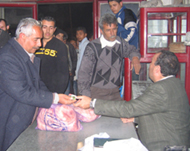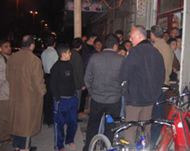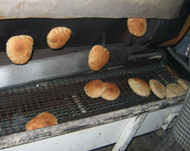Gaza faces food shortage, says UN
Wheat-flour stocks have run out in the Gaza Strip, with most bakeries closing and the United Nations warning of a looming humanitarian crisis after a nearly two-month commercial closure of Gaza imposed by Israel.

Gaza’s 1.5 million Palestinians face an unprecedented food shortage because of Israeli closures that have prevented the import of wheat, the United Nations Office for the Coordination of Humanitarian Affairs in the Occupied Palestinian Territories (OCHA) said on Sunday.
Emergency shipments of food will be brought into Gaza from Egypt on Monday, a US diplomat announced on Sunday after hosting talks on the re-opening of the Al-Mintar (Karni) border crossing point between Gaza and Israel.
Karni is the main import and export point for all goods in and out of Gaza.
“The situation is extremely serious,” David Shearer, OCHA’s head of operations, told Aljazeera.net. “In the next day or so all bread supplies will dry up.
“There is very little else around in terms of rice, which is also short in supply. Bread is the staple diet for Palestinians. It is also the food of the poorest people, so if that’s not available, people will start to go hungry,” Shearer said.
Richard Jones, the US ambassador to Israel, told reporters: “We have agreed that the crossing from Kerem Shalom will open tomorrow for imports of food and other essential humanitarian products from Egypt.”
Kerem Shalom is inside Israel, at the corner of the border with Gaza and Egypt.
According to the World Bank, 65% of Gazans live below the poverty line, surviving on less than $2 a day.
“What we were warning before was that stocks were getting low. Today we are saying stocks are gone, and the end-point has been reached,” Shearer said.
Vanishing stocks
 |
|
Bakeries limited the amount of |
The United Nations Relief and Works Agency and the World Food Programme have run out of emergency flour stocks, he said.
The Karni crossing is Gaza’s commercial lifeline, the only point through which large-scale import of wheat and other goods can take place. The crossing has been closed for nearly 50 days this year, a total of 60% of the time, according to the UN.
The financial losses to the Palestinian economy are estimated at $500,000 a day.
The crossing was opened sporadically during the closure, but 3594 metric tonness of wheat flour contracted to local mills was unable to enter Gaza during this time, the World Food Programme said.
According to the Ministry of Economy, Palestinians in Gaza consume about 350 tonnes of flour a day, but all flour mills have shut down because of the depletion of wheat stocks, and bakeries are working through their last bags of stored flour.
Long lines
 |
|
Customers line up to buy bread |
As word of the shortage spread, long lines formed through the night in front of the few bakeries still open for business, with residents flocking there to buy bread and flour for families under the roars of Israeli warplanes circling Gaza’s skies.
Bakery owners were rationing bags of bread they had baked with the limited flour stocks in their emergency storage. In some instances, fights broke out between desperate customers.
“My husband waited for three hours to buy a bag of flour so we can bake at home, and all the bakeries have closed in our town. We don’t know what we will do in a few days” said 50-year-old Um Ramadan, who has an eight-member family.
The UN says the usual 30- to 60-day wheat stock has been exhausted, and other basic food commodities, such as dairy products and fruit, are in short supply.
Rice and sugar are selling at more than twice their normal price and are difficult to find in stores, while prices of local vegetables marked for export, such as tomatoes and green peppers, have plummeted.
‘On a diet’
 |
|
Bread is a staple for Gazans. |
Nabil Abu Rudeinah, a spokesman for the Palestinian president, criticised the closure of the border crossing.
“Israel must realise it cannot starve the Palestinians,” he said. “The situation is critical and we cannot accept it. We have asked the Americans to intervene.”
Dov Weisglass, the Israeli prime ministerial adviser, recently described the Israeli sanctions policy after Hamas’s January election victory as one in which Palestinians would be “put on a diet”, but not starved to death.
The United Nations has condemned the closure and noted that 40% of children in the Gaza Strip suffer from malnutrition and that under the fourth Geneva Convention, Israel, as an occupying power, is responsible for the welfare of Palestinians in the Gaza Strip.
Israeli authorities say the crossing has been closed because of security threats, specifically, fears that tunnels had been built under the crossing. Palestinians have rejected such claims, saying the closure is politically motivated.
Kerem Shalom
After the meeting Jones’s home near Tel Aviv, chief Palestinian negotiator Saeb Erikat said: “We decided on an Egyptian-Palestinian-US meeting to agree on arrangements for goods to enter (Gaza) through Kerem Shalom.”
Jones said a meeting would be held Monday at Kerem Shalom to work out the operational details for food shipments from Egypt to Gaza, Reuters reported.
Israel had proposed a limited transfer of goods via Kerem Shalom. Palestinians had rejected the offer, saying Kerem Shalom was too small to meet the needs of Gazans.